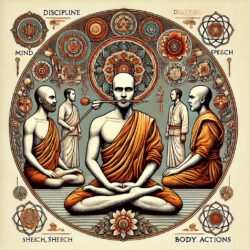This is a conversation between Arjun and Sejal.
They are discussing about the topic of Control of Trikaranas (Mind, Speech and Body) in Sanatana Dharma.
Hello Sejal.
Arjun, let's dive into the control of mind, speech, and body, collectively known as the trikaraṇas - the three instruments. We've learned that maintaining good relations with others through morality leads to a harmonious life. However, harmony with others starts with harmony within oneself.
Absolutely, Sejal. To achieve this, one must gain control over their mind, speech, and body. As the Manu Smriti states, these three forms of self-restraint guide individuals towards a life of virtue, self-discipline, and harmony with others.
Indeed. No creature should be physically or mentally harmed. A person’s life should be helpful to others. Even the thought of hurting others should not arise in the mind; this is the control of the mind. If such a thought arises, it should not be expressed outwardly through speech; this is the control of speech. And even if expressed, it must be prevented from translating into physical action; this is the body control.
So, when a thought arises, there are three checkpoints within us to prevent it from materializing: mind, speech, and body. The wise test their thoughts, consider the consequences, and act with discernment, avoiding impulsive actions driven by emotions like anger.
Exactly. Control of the mind is crucial as emotions are driven by the pursuit of happiness and satisfaction. The challenge lies in regulating the desires stemming from these emotions. The mind must recognize that it is the master and assert its control over the sensory organs and organs of action.
The Bhagavad Gita encapsulates this struggle, teaching that desires and anger born of the mode of passion are insatiable and sinful. To master one's desires and maintain a steadfast mind, one must consciously redirect it towards virtuous and righteous matters.
That's right. Lord Kŗshṇa advises Arjuna in the Bhagavad Gita that, by practice and dispassion, the restless and unsteady mind can be restrained. It's about bringing the mind under the control of the Self.
Yogi Vemana's analogy of molten ghee setting hard quickly illustrates how the mind should not be allowed to wander and attach itself to objects of pleasure. Instead, thoughts should remain focused on meaningful pursuits, embodying mental austerity.
Embracing these principles helps achieve mastery over the mind. Now, let's talk about control of speech. It's essential to exercise control over what we want to say and how we communicate. Before speaking, consider if the listener can comprehend, is interested, and will find utility in what is being said.
Timing and context are crucial when conveying a message, especially when it involves an uncomfortable truth. Honesty is paramount; falsehoods can strip us of our integrity. Listening attentively is equally important, understanding what's being said before responding appropriately.
Exactly. Foolish people tend to speak excessively, while the wise think carefully and speak only when necessary or remain silent. The Subhāshita advises speaking the truth that is pleasant, never the truth that is unpleasant, and always avoiding falsehoods.
Bhartŗhari Niti Satakam emphasizes that refined and cultured speech is a person’s true adornment, not external make-up. Rash and angry words can lead to endless difficulties, so it's important to speak with kindness and without causing harm.
The Bhagavad Gita states that speech should be calm, truthful, pleasant, and beneficial, along with the practice of studying the Vēdas. By embracing these principles, one can master the art of communication and lead a harmonious life. Arjun, let's now discuss the control of the body. Controlling the physical body is essential, which means we must be deliberate in our actions. Rather than acting hastily, we should carefully consider the potential outcomes of our actions, akin to the adage "measure twice, cut once". If an action is deemed beneficial, we proceed with thoughtfulness; if not, we avoid rushing into it.
That's a good point, Sejal. The mind is susceptible to temptations and addictions. Yielding to every whim can lead to downfall. Therefore, it's crucial to discipline both the mind and actions, steering them towards righteousness.
It may be challenging initially, but with the adoption of noble values, the mind will naturally gravitate towards positivity. Cultivating such values often involves association with virtuous individuals because our behavior is influenced by our companions.
I see. Instilling virtuous values during childhood and adolescence is vital because the mind becomes opinionated and hard to change as one ages, just like a sapling that can be bent, but not when it grows into a mighty tree.
Exactly. Self-control is necessary to overcome selfish desires, which are the root of evil and suffering. Acts such as greed, corruption, bribery, and deceit stem from selfishness and must be curbed.
The concept of prēyas and shrēyas in the Kathopanishad distinguishes between choices that are pleasant and those that are beneficial. Desires that give short-term pleasure are called prēyas, while those that give enduring happiness are called shrēyas.
That's right. Desires must be carefully evaluated before jumping into action. True peace comes from the absence of desires. Renouncing desires is nobler than fulfilling them all, as unmet desires cause inner turmoil.
However, not all desires are detrimental. The Bhagavad Gita states that desire in beings that is not contrary to Dharma is acceptable. It also specifies what constitutes control of the body, such as worshiping the gods, maintaining purity, honesty, celibacy, and non-violence.
Such discipline enables one to master their actions, aligning them with moral and ethical values.
Some anecdotes from epics can illustrate the importance of exercising control over mind, speech, and body. For example, the teachings from the Mahābhārata and Rāmāyaṇa can provide valuable lessons.
Absolutely, Arjun. These teachings emphasize that harmony with others starts with harmony within oneself. By controlling our mind, speech, and body, we can lead a life of virtue, self-discipline, and harmony with others.

